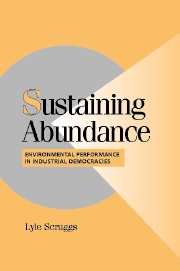Book contents
- Frontmatter
- Contents
- List of Figures and Tables
- Preface
- 1 INTRODUCTION
- 2 MEASURING NATIONAL ENVIRONMENTAL PERFORMANCE
- 3 ECONOMIC DEVELOPMENT, GEOGRAPHIC ADVANTAGE, AND ENVIRONMENTAL PERFORMANCE
- 4 PUBLIC OPINION, ENVIRONMENTAL MOBILIZATION, AND ENVIRONMENTAL PERFORMANCE
- 5 PLURALISM, CORPORATISM, AND ENVIRONMENTAL PERFORMANCE
- 6 POLITICAL INSTITUTIONS
- 7 CHECKING THE ROBUSTNESS OF THE RESULTS
- 8 CONCLUSION
- Appendix I Estimated Measures of Environmental Performance
- Appendix II Institutions for Environmental Policy Making in Fourteen Countries
- References
- Index
- Titles in the series
3 - ECONOMIC DEVELOPMENT, GEOGRAPHIC ADVANTAGE, AND ENVIRONMENTAL PERFORMANCE
Published online by Cambridge University Press: 07 December 2009
- Frontmatter
- Contents
- List of Figures and Tables
- Preface
- 1 INTRODUCTION
- 2 MEASURING NATIONAL ENVIRONMENTAL PERFORMANCE
- 3 ECONOMIC DEVELOPMENT, GEOGRAPHIC ADVANTAGE, AND ENVIRONMENTAL PERFORMANCE
- 4 PUBLIC OPINION, ENVIRONMENTAL MOBILIZATION, AND ENVIRONMENTAL PERFORMANCE
- 5 PLURALISM, CORPORATISM, AND ENVIRONMENTAL PERFORMANCE
- 6 POLITICAL INSTITUTIONS
- 7 CHECKING THE ROBUSTNESS OF THE RESULTS
- 8 CONCLUSION
- Appendix I Estimated Measures of Environmental Performance
- Appendix II Institutions for Environmental Policy Making in Fourteen Countries
- References
- Index
- Titles in the series
Summary
In this chapter, I evaluate economic and structural explanations of national environmental performance. One of the most prominent explanations for differing commitments to environmental quality in the contemporary literature is national income and economic development. Conventional wisdom (and many studies) suggests that higher incomes increase people's attention to environmental problems and willingness to pay for environmental improvements (Baumol and Oates 1988; Grossman and Krueger 1995; Inglehart 1977, 1990; Jänicke 1992). Often associated with increased wealth are broader structural changes in the economy that, according to many, should reduce environmental pressures by shifting production and consumption away from pollution-intensive goods toward less polluting services. Without necessarily rejecting such explanations, others suggest that general physical and demographic features of a society help to explain differences in the salience of environmental performance and scope for better environmental quality (Cropper and Griffiths 1994; Kitschelt 1989).
These factors – national wealth, the structure of production, demographics, and geography – can all be considered structural explanations of environmental performance in the sense that they cannot be easily changed, or if they can be (as in the case of wealth or population density), they can change only very slowly. For instance, increasing population density is not a conscious strategy of trying to augment concern for the environment; and, practically speaking, there is little that a democratic country can do in the short run to alter its population density.
- Type
- Chapter
- Information
- Sustaining AbundanceEnvironmental Performance in Industrial Democracies, pp. 55 - 77Publisher: Cambridge University PressPrint publication year: 2003



